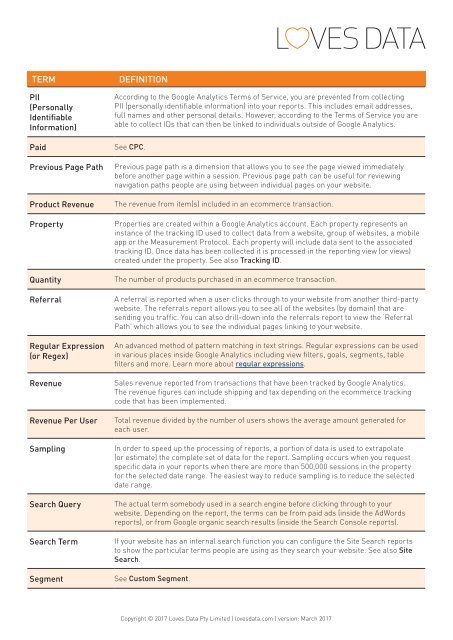GA_Glossary_March_2017
Create successful ePaper yourself
Turn your PDF publications into a flip-book with our unique Google optimized e-Paper software.
TERM<br />
PII<br />
(Personally<br />
Identifiable<br />
Information)<br />
Paid<br />
Previous Page Path<br />
Product Revenue<br />
Property<br />
Quantity<br />
Referral<br />
Regular Expression<br />
(or Regex)<br />
Revenue<br />
Revenue Per User<br />
Sampling<br />
Search Query<br />
Search Term<br />
Segment<br />
DEFINITION<br />
According to the Google Analytics Terms of Service, you are prevented from collecting<br />
PII (personally identifiable information) into your reports. This includes email addresses,<br />
full names and other personal details. However, according to the Terms of Service you are<br />
able to collect IDs that can then be linked to individuals outside of Google Analytics.<br />
See CPC.<br />
Previous page path is a dimension that allows you to see the page viewed immediately<br />
before another page within a session. Previous page path can be useful for reviewing<br />
navigation paths people are using between individual pages on your website.<br />
The revenue from item(s) included in an ecommerce transaction.<br />
Properties are created within a Google Analytics account. Each property represents an<br />
instance of the tracking ID used to collect data from a website, group of websites, a mobile<br />
app or the Measurement Protocol. Each property will include data sent to the associated<br />
tracking ID. Once data has been collected it is processed in the reporting view (or views)<br />
created under the property. See also Tracking ID.<br />
The number of products purchased in an ecommerce transaction.<br />
A referral is reported when a user clicks through to your website from another third-party<br />
website. The referrals report allows you to see all of the websites (by domain) that are<br />
sending you traffic. You can also drill-down into the referrals report to view the ‘Referral<br />
Path’ which allows you to see the individual pages linking to your website.<br />
An advanced method of pattern matching in text strings. Regular expressions can be used<br />
in various places inside Google Analytics including view filters, goals, segments, table<br />
filters and more. Learn more about regular expressions.<br />
Sales revenue reported from transactions that have been tracked by Google Analytics.<br />
The revenue figures can include shipping and tax depending on the ecommerce tracking<br />
code that has been implemented.<br />
Total revenue divided by the number of users shows the average amount generated for<br />
each user.<br />
In order to speed up the processing of reports, a portion of data is used to extrapolate<br />
(or estimate) the complete set of data for the report. Sampling occurs when you request<br />
specific data in your reports when there are more than 500,000 sessions in the property<br />
for the selected date range. The easiest way to reduce sampling is to reduce the selected<br />
date range.<br />
The actual term somebody used in a search engine before clicking through to your<br />
website. Depending on the report, the terms can be from paid ads (inside the AdWords<br />
reports), or from Google organic search results (inside the Search Console reports).<br />
If your website has an internal search function you can configure the Site Search reports<br />
to show the particular terms people are using as they search your website. See also Site<br />
Search.<br />
See Custom Segment.<br />
Copyright © <strong>2017</strong> Loves Data Pty Limited | lovesdata.com | version: <strong>March</strong> <strong>2017</strong>


